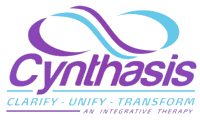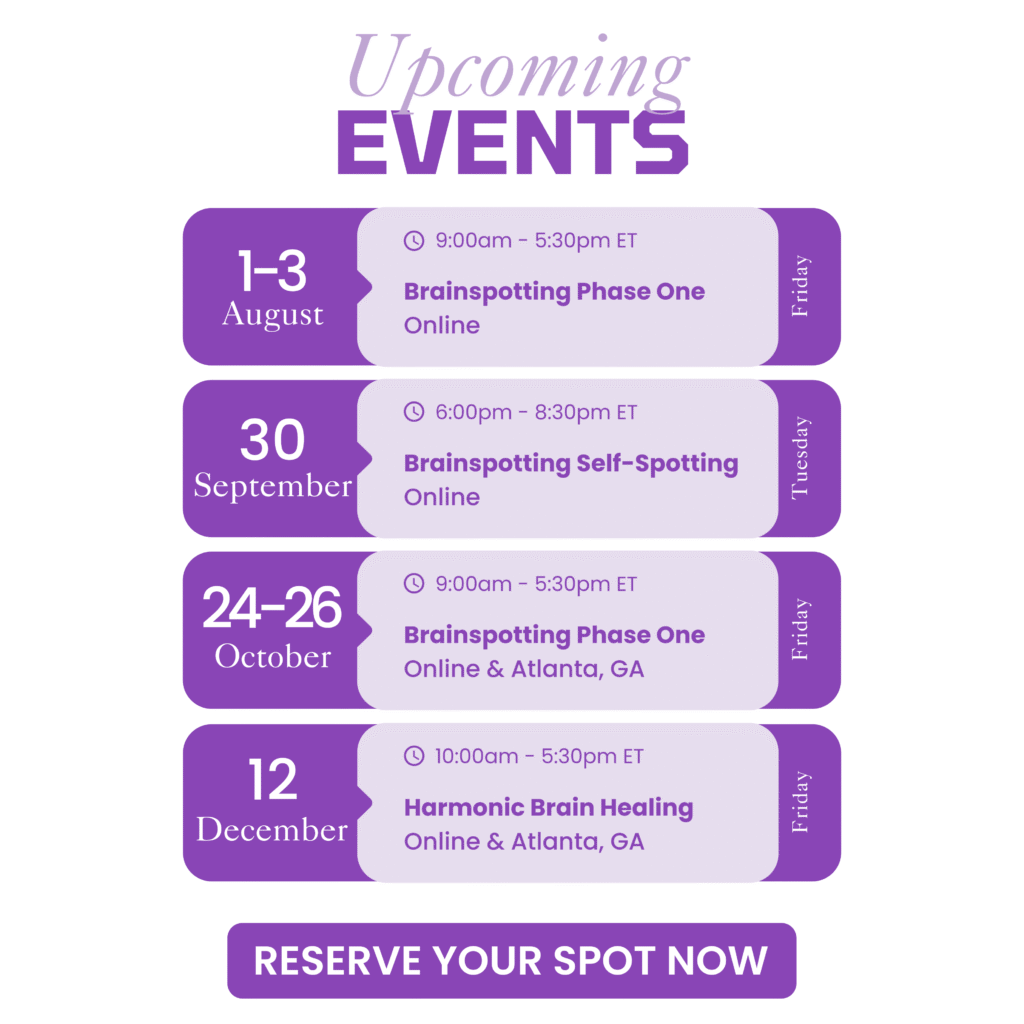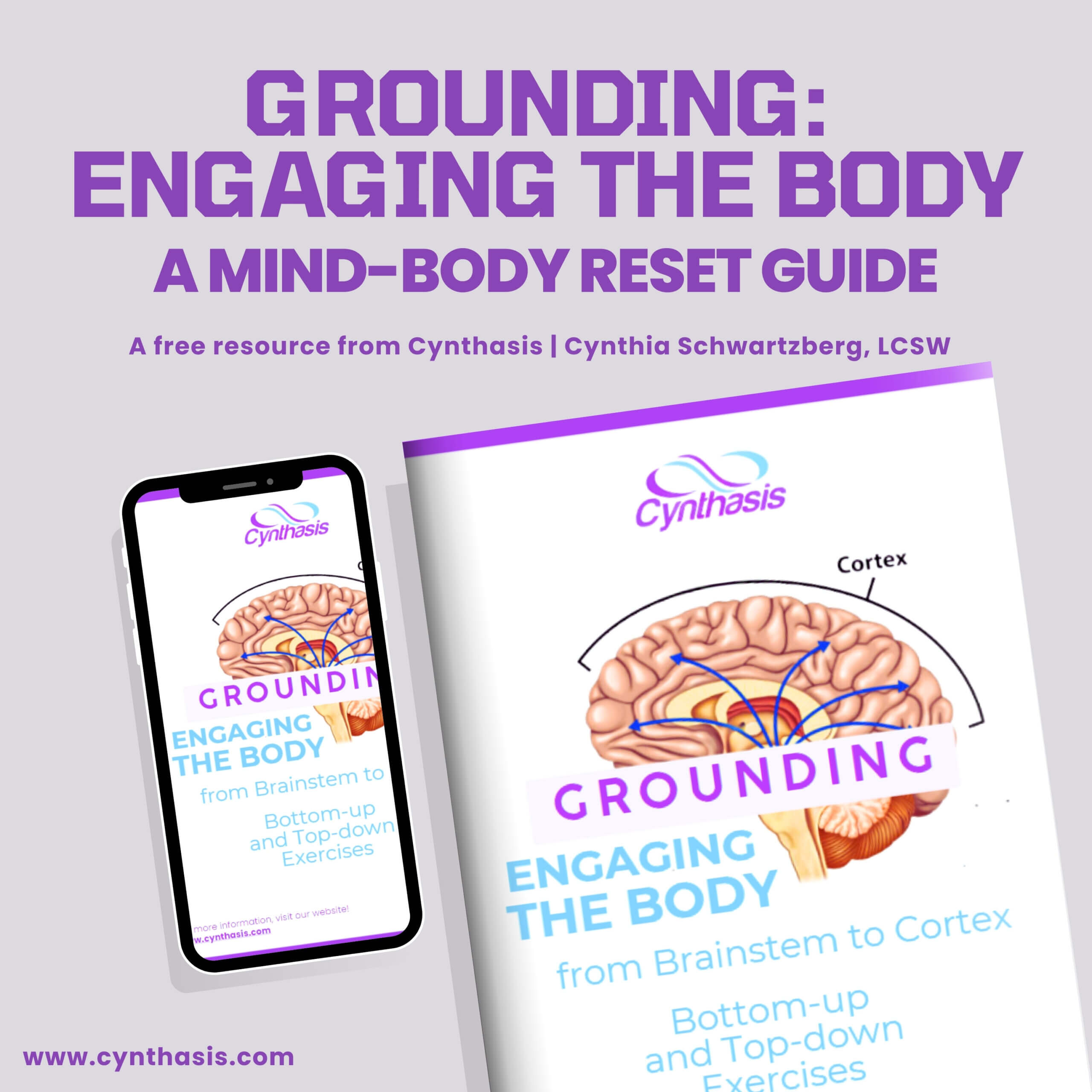Brainspotting Phase One Overview and Details
The Brainspotting Phase One training is a comprehensive three-day training crafted for mental health professionals who are eager to explore innovative therapeutic techniques. Ideal for licensed professional counselors, social workers, psychologists, psychoanalysts, marriage and family therapists, substance abuse counselors, and students. This training delves into the foundational principles of Brainspotting. Participants will learn four basic Brainspotting techniques designed to enhance their practice and offer deep therapeutic benefits to their clients.
Training Details
Duration: Three-Day Training
Certificates: Participants will receive a certificate upon completion.
Continuing Education Details: Offered specific to each training. CE certificate is a separate certificate.
Who Should Attend? This training is open to all licensed professionals and students in the mental health field who are curious and eager to expand their therapeutic skills.
Registration Details
Early Registration : $745 Standard Registration : $795 Late Registration : $845
Student or Repeat : $400 student rate-actively enrolled in a graduate program in a mental health-related field (psychology, social work, counseling, marriage and family therapy) (documentation required, name of supervisor and license working toward).
Cancellation & Refund Policy : Should you need to cancel, we offer a full refund if the cancellation is made up to 14 days before the event, minus a $75 administrative fee per registration. purchased.
This course sets the stage for advanced skills in Brainspotting, paving the way for further professional development in specialized therapeutic methods.
You Will Learn
The Brainspotting Phase One training emphasizes a practical and extensive introduction to the core techniques and applications of Brainspotting. This Training will be a hands-on learning experience with PowerPoint lectures, Q&A sessions, live demonstrations, and practicums.
Outside Window
A therapeutic approach where the therapist guides the client to focus on an external point within their visual field to promote deep healing by connecting the external gaze with internal experiences.
Inside Window Brainspotting
A therapeutic technique where the client intuitively identifies a specific spot in their visual field that resonates with their internal emotional state. This self-directed focus helps to access and process deeply held trauma and emotions, leading to profound healing and self-awareness.
Gazespotting
A focused therapeutic technique that utilizes the client's natural gaze to access and process deep-seated emotional and psychological experiences
Resource Brainspotting
A therapeutic technique where client intuitively identifies a low-activation spot in their body and visual field, supporting the deep processing of deep trauma and emotions within the client’s window of tolerance.
In addition, participants will:
- Review the standards of care and professional practice for Brainspotting practitioners.
- Research that supports the primary assumptions of Brainspotting
- Explore the challenges of research and evidence-based treatment for conditions such as Complex PTSD
Learning Objectives
By the end of this training, participants will be able to:
- Summarize the standards of care and professional practice of the International Brainspotting Association.
- Describe the hypothesized neurological underpinnings of how Brainspotting works.
- Summarize the research that supports the hypothesized way in which eye positions activate and access midbrain activity.
- Explain the uncertainty principle as it relates to Brainspotting.
- Describe the concepts of simultaneous neurobiological and relational attunement.
- Explain the importance of client-therapist attunement during Brainspotting.
- Explain how the treatment frame is set and held by the therapist.
- Explain the role of focused mindfulness in Brainspotting.
- Discuss the similarities and differences between the activation and resource models of Brainspotting.
- Explain the concept of limbic countertransference.
- Demonstrate a basic mastery of the use of the outside window Brainspotting technique.
- Demonstrate a basic mastery of the use of the inside window Brainspotting technique
- Demonstrate a basic mastery of the use of the gaze spot Brainspotting technique.
- Demonstrate a basic mastery of the use of the resource model of the Brainspotting technique.
- Assess the appropriate Brainspotting techniques for the treatment of Post-traumatic stress disorder, including the Dissociative Subtype, and other trauma-related symptoms.
- Describe two challenges to assessing and providing evidence-based treatment to individuals with Complex PTSD.
Training Schedule
- Registration Time: Begins at 8:30 AM on the first day.
- Daily Training Hours: From 9:00 AM to 5:30 PM.
Our Testimonials
- H.H.

Cynthia and Christine are tremendously skilled and attuned trainers. I feel confident in my ability to take this to my clients right away and would recommend their training to anyone without hesitation. I cannot wait for phase 2!
- A.C.

Brainspotting is exactly what I was looking for to round out my clinical tool box of somatic approaches including EFT Tapping, Polyvagal Theory, Safe and Sound Protocol and Hypnotherapy.
- C.M.

Cynthia and Christine were very knowledgeable and this training was well worth my time and money spent on it. You can begin using the skills taught the next day you return to work. It is invaluable!! Thank you so much.
- D.E.

The Phase 1 training with Cynthia and Christine exceeded my expectations. It was wonderful to be taught by two clinicians who clearly ‘walked the talk’ and modeled the concepts they were teaching. This training has changed the way I work as a therapist.
- K.C.

“Before participating in the Phase 1 training with Cynthia, I was a little skeptical about how effective this therapy could be. After 3 days of intense training with a skilled and compassionate instructor/therapist like Cynthia, I can confidently and emphatically say “I am a believer!”
- A.C.

“Brainspotting is an incredibly powerful yet gentle technique allowing client’s to take control of their therapy experience. I am excited to include it in my trauma resolution toolbox and I was able to start using it the day after training with tremendous results.
- K.S.

The passion, organization and knowledge of all trainers and consultants involved in the training is such an asset.
- T.S.

I came into this class a bit skeptical but I had heard great things about it. As we practiced and watched REAL demos (not “acting”), it really started making sense to me. And the instructors’ passion for BSP was contagious. Once the training was over I felt comfortable enough to immediately begin using BSP with some of my clients.
- N.C.

This training, and Cynthia, in particular, was amazingly helpful, well-structured, and executed to perfection. I highly recommend this training.
- K.C.

My understanding of the science behind it is clear and I’ve acquired the skills necessary to begin using it with my clients immediately after the Phase 1 training. Brainspotting has already done a great deal for me personally and I am confident it will do the same for my clients. This is a game changer.”
- J.M.

This training is highly informative and eye-opening. Cynthia and the team did a phenomenal job in sharing their expertise, demonstrating the use of this profoundly healing technique and preparing us clinicians to bring Brainspotting to our practice. The three-day training was transformative and completely worthwhile.
- J.C.

The training not only prepared me to practice Brainspotting with confidence but was also truly a warm and enjoyable experience.
- R.V.

Cynthia and Chris are incredibly warm, compassionate, and, of course, incredibly knowledgeable and skilled clinicians. With their help, along with the wonderful assistants, I feel very comfortable in beginning my Brainspotting journey and truly feel supported, which will help me be more attuned and present with my clients.
- O.Q.

The instructors and assistants were highly skilled and possessed a significant wealth of knowledge. Excellent training! Highly recommended!!!!
- T.P.

Cynthia and Christine are tremendously skilled and attuned trainers. I feel confident in my ability to take this to my clients right away and would recommend their training to anyone without hesitation. I cannot wait for Phase Two!
- H.H.

Cynthia and Christine are tremendously skilled and attuned trainers. I feel confident in my ability to take this to my clients right away and would recommend their training to anyone without hesitation. I cannot wait for phase 2!
- A.C.

Brainspotting is exactly what I was looking for to round out my clinical tool box of somatic approaches including EFT Tapping, Polyvagal Theory, Safe and Sound Protocol and Hypnotherapy.
- C.M.

Cynthia and Christine were very knowledgeable and this training was well worth my time and money spent on it. You can begin using the skills taught the next day you return to work. It is invaluable!! Thank you so much.
- D.E.

The Phase 1 training with Cynthia and Christine exceeded my expectations. It was wonderful to be taught by two clinicians who clearly ‘walked the talk’ and modeled the concepts they were teaching. This training has changed the way I work as a therapist.
- K.C.

“Before participating in the Phase 1 training with Cynthia, I was a little skeptical about how effective this therapy could be. After 3 days of intense training with a skilled and compassionate instructor/therapist like Cynthia, I can confidently and emphatically say “I am a believer!”
- A.C.

“Brainspotting is an incredibly powerful yet gentle technique allowing client’s to take control of their therapy experience. I am excited to include it in my trauma resolution toolbox and I was able to start using it the day after training with tremendous results.
- K.S.

The passion, organization and knowledge of all trainers and consultants involved in the training is such an asset.
- T.S.

I came into this class a bit skeptical but I had heard great things about it. As we practiced and watched REAL demos (not “acting”), it really started making sense to me. And the instructors’ passion for BSP was contagious. Once the training was over I felt comfortable enough to immediately begin using BSP with some of my clients.
- N.C.

This training, and Cynthia, in particular, was amazingly helpful, well-structured, and executed to perfection. I highly recommend this training.
- K.C.

My understanding of the science behind it is clear and I’ve acquired the skills necessary to begin using it with my clients immediately after the Phase 1 training. Brainspotting has already done a great deal for me personally and I am confident it will do the same for my clients. This is a game changer.”
- J.M.

This training is highly informative and eye-opening. Cynthia and the team did a phenomenal job in sharing their expertise, demonstrating the use of this profoundly healing technique and preparing us clinicians to bring Brainspotting to our practice. The three-day training was transformative and completely worthwhile.
- J.C.

The training not only prepared me to practice Brainspotting with confidence but was also truly a warm and enjoyable experience.
- R.V.

Cynthia and Chris are incredibly warm, compassionate, and, of course, incredibly knowledgeable and skilled clinicians. With their help, along with the wonderful assistants, I feel very comfortable in beginning my Brainspotting journey and truly feel supported, which will help me be more attuned and present with my clients.
- O.Q.

The instructors and assistants were highly skilled and possessed a significant wealth of knowledge. Excellent training! Highly recommended!!!!
- T.P.

Cynthia and Christine are tremendously skilled and attuned trainers. I feel confident in my ability to take this to my clients right away and would recommend their training to anyone without hesitation. I cannot wait for Phase Two!
Cynthia is a natural teacher and has a very approachable, calming presence. Even when she’s speaking to a very large crowd, I feel like she’s speaking straight to my heart. If you have a chance to hear her speak, do yourself a favor and seize the opportunity to do so. As a teacher, Cynthia brings a...
-A.N.
Cynthia is a channel for transpersonal energy. Her work is about bringing the spiritual life into an embodied experience. She is a teacher, healer, counselor, and fellow traveler. Cynthia is a clear communicator. She combines research and her knowledge from her clinical work in how the b...
M.S.
“Cynthia and Christine are tremendously skilled and attuned trainers. I feel confident in my ability to take this to my clients right away and would recommend their training to anyone without hesitation. I cannot wait for phase 2!”
-H.H.
“Cynthia and Christine were very knowledgeable and this training was well worth my time and money spent on it. You can begin using the skills taught the next day you return to work. It is invaluable!! Thank you so much.”
-C.M.
“This training was so much more than just learning how to use a technique! This training opened my eyes and heart to another way of being with my clients to bring further healing and renewal to their lives.”
-K.H.
“The Phase 1 training with Cynthia and Christine exceeded my expectations, it was wonderful to be taught by two clinicians who clearly ‘walked the talk’ and modeled the concepts they were teaching. This training has changed the way I work as a therapist in ways that all my clients are already benefi...
-D.E.
Cynthia is a channel for transpersonal energy. Her work is about bringing the spiritual life into an embodied experience. She is a teacher, healer, counselor, and fellow traveler. Cynthia is a clear communicator. She combines research and her knowledge from her clinical work in how the b...
-M.S.
Before participating in the Phase 1 Brainspotting Training with Cynthia, I was a little skeptical about how effective this therapy could be, despite the prompting by several colleagues to give it a try. After 3 days of intense training with a skilled and compassionate instructor/therapist like Cynth...
-K.C.
I came into this class a bit skeptical but I had heard great things about it. As we went along and as we practiced and watched REAL demos (not “acting”), it really just started making sense to me. And the instructors’ passion for BSP was contagious. Once the training was over I fel...
-T.S.
Brainspotting is an incredibly powerful yet gentle technique allowing client’s to take control of their therapy experience. I am excited to include it in my trauma resolution toolbox and I was able to start using it the day after training with tremendous results. This is exactly what I was loo...
-A.C.
The passion, organization and knowledge of all trainers and consultants involved in the training is such an asset.
-K.S.
This training, and Cynthia, in particular, was amazingly helpful, well-structured, and executed to perfection. I highly recommend this training.
-N.C.
This training is highly informative and eye-opening. Cynthia and the team of consultants did a phenomenal job in sharing their expertise, demonstrating the use of this profoundly healing technique and preparing us clinicians to bring Brainspotting to our practice. The three-day training was transfor...
-J.M.
The training not only prepared me to practice brainspotting with confidence but was also truly a warm and enjoyable experience.
-J.C.
The instructors and assistants were highly skilled and possessed a significant wealth of knowledge. Excellent training! Highly recommended!!!!
-O.Q.
Cynthia and Chris are incredibly warm, compassionate, and, of course, incredibly knowledgeable and skilled clinicians. With their help, along with the wonderful assistants, I feel very comfortable in beginning my Brainspotting journey and truly feel supported, which will help me be more attuned and...
-R.V.
Cynthia and Christine are tremendously skilled and attuned trainers. I feel confident in my ability to take this to my clients right away and would recommend their training to anyone without hesitation. I cannot wait for Phase Two!
-T.P.
“Cynthia is a channel for transpersonal energy. Her work is about bringing the spiritual life into an embodied experience… (full review continues as above).”
-M.S
“Before participating in the Phase 1 Brainspotting Training with Cynthia, I was a little skeptical about how effective this therapy could be… (full review continues as above).”
-K.C.
“I came into this class a bit skeptical but I had heard great things about it… (full review continues as above).”
-T.S.
“Brainspotting is an incredibly powerful yet gentle technique allowing client’s to take control of their therapy experience… (full review continues as above).”
-A.C.

Have Questions About
Brainspotting Phase One
Training?
Registration For Our
Brainspotting Phase One
Training
If you have any questions about the Brainspotting Phase One Training or need more information, please fill out the form below or contact us at info@cynthasis.com. Our team at Cynthasis is dedicated to assisting you and will get back to you promptly. We are here to support your journey towards personal and professional growth. Don’t hesitate to reach out—we look forward to connecting with you!


